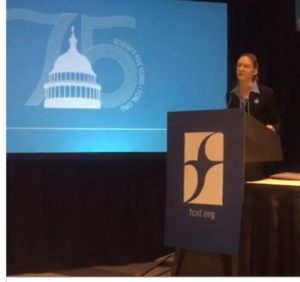
Thanks to training by Friends Committee on National Legislation (FCNL), several hundred more Quakers are now well-prepared for lobbying congress. Yesterday and today, FCNL held its Public Policy Institute in advance of the annual FCNL meeting, providing visiting Friends all the tools they need to effectively meet with congressional representatives and senators.
This year Friends have gathered to lobby in support of a farm bill that should keep food on the tables of families struggling with hunger. Two essential tools have been provided: knowledge about hunger’s negative impact, and lobbying know how. Friends were given a first-hand account of what hunger feels like for families, and shown how farm bill provisions can help. They were then trained in how to positively influence congressional thinkers through well-presented data, backed up by compelling story-telling.
Tool One: The Issue of Hunger and the Farm Bill.
To talk about hunger, FCNL convened a panel of experts who showed that lack of food hurts the minds and hearts of children and adults. Hungry children, for example, aren’t able to focus on learning, while hungry parents find it harder to be effective caregivers. One FCNL panelist, Barbie, was a mother from North Philadelphia who both serves as a food justice advocate and also relies on the Supplemental Nutrition Assistance Program (SNAP) to make ends meet when feeding her children. Her willingness to share her very compelling story was helpful. She’s been featured in film, at the White House, and in public policy spaces like FCNL. Advocacy work is humbling, she said, because “if I wasn’t poor I wouldn’t be here,” yet her stories are necessary for lawmakers to understand hunger’s impact.
Barbie shared heartbreaking techniques she taught her kids how to use–to help them power through moments when they were so hungry they couldn’t think about anything but food. And, while she admits it’s hard to walk in her shoes, she says it’d be even harder to not try do something about it. To hear her talk first hand, visit the Center for Hunger-Free Communities’ website.
 We also heard from Amelia Kegan, the Legislative Director for Domestic Policy at FCNL. From her we learned facts and figures, passion, and poise under fire. Amelia preached ‘hunger justice’ even as she delivered concrete information that would help lobbying Friends make stronger cases. Her inspirational talk can be viewed on FCNL’s Facebook page.
We also heard from Amelia Kegan, the Legislative Director for Domestic Policy at FCNL. From her we learned facts and figures, passion, and poise under fire. Amelia preached ‘hunger justice’ even as she delivered concrete information that would help lobbying Friends make stronger cases. Her inspirational talk can be viewed on FCNL’s Facebook page.
The farm bill is the largest source of food assistance for millions of families in our country. One essential aspect of it is SNAP – which provides support for 40 million people, half of whom are children. The subsidy is less than $2/day, but that small amount translates to a meal children otherwise wouldn’t have.
The House and the Senate have passed their own, differing, versions of the farm bill, and the SNAP re-authorization is quite different in the two versions. The Senate bill protects SNAP and doubles down on supporting people who are particularly vulnerable. It passed the Senate with a very nonpartisan 87-11 vote. The House bill however applies further restrictions and decreases access to SNAP. It passed with narrow margins on a strictly partisan vote. An example of the differences between the two bills centers on a SNAP work requirement. Currently people who are ‘single and able to work’ can receive three months of the benefit, but states have the option to waive this rule when there are no jobs.
The Senate version of the bill preserves this option for the states, while the House version deletes it.
Friends’ are visiting their representatives and senators to encourage them to pass a final bill that mirrors the Senate version. In addition to maintaining protection from hunger, FCNL explains that such a move would demonstrate that cooperation yields a ‘win’ for everyone (as is exemplified by the non-partisan Senate version of the bill).
Tool Two: How to Lobby
 After being given the facts and figures about hunger, Friends needed to learn what to do with this knowledge. FCNL has a clear process for supporting volunteer lobbyists during visits: they teach them to share personal stories, to identify a leader, choose a note-taker, and empower several storytellers to personally testify to the importance of the“ask.” They also suggest the group designate someone to serve as a follow up contact with congressional staff after the meeting concludes.
After being given the facts and figures about hunger, Friends needed to learn what to do with this knowledge. FCNL has a clear process for supporting volunteer lobbyists during visits: they teach them to share personal stories, to identify a leader, choose a note-taker, and empower several storytellers to personally testify to the importance of the“ask.” They also suggest the group designate someone to serve as a follow up contact with congressional staff after the meeting concludes.
Friends were given time in small groups, assembled by state, so they could develop lobby visit plans. Pennsylvania had the largest group – with 45 lobbyists! We used worksheets to guide our process, and received handouts we could leave with the lawmakers at the end. The process is so clear and supportive that Friends who had lobbied only once before could easily step into the role of leader.
Big Finale
All of the training led up to lobbying – 400 Friends strong. Senators and Representatives were visited by Quakers all day on Friday!
Stay tuned to pym.org/news for more first-hand Quaker lobbying stories and pictures throughout the weekend.